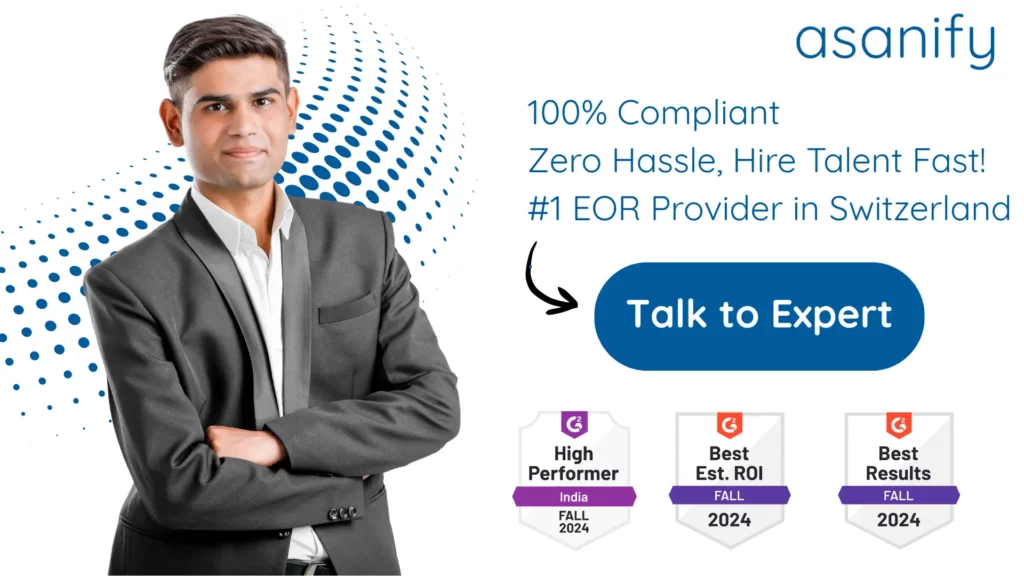Switzerland, known for its strong economy, innovation-driven industries, and high quality of life, is a top destination for global talent. However, before hiring in Switzerland, employers must navigate the country’s strict immigration and work permit system. Securing the correct work authorization is essential for compliance and smooth onboarding of foreign employees.
Switzerland’s system varies significantly based on nationality, skill level, and intended length of stay. While EU/EFTA citizens enjoy relatively easier access to the Swiss labor market, non-EU nationals face quota restrictions and stricter eligibility criteria. Employers must ensure applications are precise, complete, and submitted within the set timelines. Partnering with immigration experts or an Employer of Record (EOR) can help businesses streamline the process and avoid costly delays.
Table of Contents
- Overview of Switzerland’s Work Permit and Visa System
- Understanding Requirements and Eligibility
- Who Needs a Work Permit in Switzerland
- Key Conditions for Obtaining a Swiss Work Visa
- Employer and Employee Eligibility
- Types of Work Visas in Switzerland
- Comparing Swiss Work Visa Types
- Advantages of the B Permit for Skilled Workers
- Application Process for Employers
- Required Documents
- Processing Timelines
- Employer Responsibilities and Compliance
- Consequences of Non-Compliance
- Maintaining Ongoing Compliance
- Tips for a Smooth Application Process
- How an Employer of Record Can Help
- How Asanify Can Help
- FAQs
Overview of Switzerland’s Work Permit and Visa System
Switzerland has a highly regulated system for managing foreign employment, with requirements depending on the worker’s nationality, professional qualifications, and the duration of stay. While EU/EFTA citizens benefit from agreements that allow relatively free movement and simplified procedures, non-EU nationals must go through a strict, quota-based process to obtain work authorization before starting employment.
Key points:
- EU/EFTA citizens – Can work in Switzerland with minimal restrictions, usually only requiring registration with the cantonal authorities if staying beyond three months.
- Non-EU nationals – Must obtain a work permit before starting work, subject to annual permit quotas and strict eligibility criteria.
- Cantonal and federal approval – Applications are reviewed first by the cantonal authorities and then by the State Secretariat for Migration (SEM).
- Employer-driven applications – The employer initiates and submits the work permit request on behalf of the employee.
- Integrated process – Most permits for non-EU nationals combine work and residence authorization into a single approval.

Understanding Requirements and Eligibility
Before starting the application process, both employers and employees must be familiar with Switzerland’s immigration rules. EU/EFTA nationals can generally work without major restrictions, though they must register with the cantonal authorities if staying for more than three months. Non-EU nationals, however, require a specific work permit often combined with a residence permit before they can begin employment. Requirements vary depending on the job type, the applicant’s professional qualifications, and the canton where the work will be performed.
Who Needs a Work Permit in Switzerland
- Required: All non-EU/EFTA nationals.
- Exempt: EU/EFTA nationals (registration still required for stays beyond three months).
- Special rules: For cross-border commuters, short-term assignments, and internships.
Key Conditions for Obtaining a Swiss Work Visa
Applicants generally must:
- Hold a confirmed job offer from a Swiss employer.
- Demonstrate relevant qualifications or professional experience.
- Meet Swiss salary and working condition standards.
- Maintain valid health insurance.
- Have a clean criminal record.
Employer and Employee Eligibility
Employers:
- Must demonstrate that the position cannot be filled by a Swiss or EU/EFTA worker.
- Must comply with local salary benchmarks and working conditions.
Employees:
- Must have specialized skills or executive-level experience.
- Must meet requirements for the specific permit category.
Suggested Read: The Complete 2025 Guide to Labour Laws in Switzerland for Global Companies
Types of Work Visas in Switzerland
Switzerland offers several work permit categories depending on the duration and nature of employment:
- L Permit – Short-term residence permit for employment up to one year.
- B Permit – Initial residence permit for longer-term employment (usually 1–2 years, renewable).
- C Permit – Permanent residence permit (after long-term stay and meeting integration criteria).
- G Permit – Cross-border commuter permit for workers living in neighboring countries.
Comparing Swiss Work Visa Types
| Visa Type | Purpose | Duration | Notes |
| L Permit | Short-term employment | Up to 12 months | Renewable in limited cases |
| B Permit | Long-term employment | 1–2 years | Renewable, tied to employer and canton |
| C Permit | Permanent residence | Indefinite | Granted after 5–10 years depending on nationality |
| G Permit | Cross-border commuting | Varies | For residents of border regions working in Switzerland |

Advantages of the B Permit for Skilled Workers
The B Permit is the most common route for skilled non-EU hires, offering stability and the possibility of renewal.
Key benefits:
- Valid for longer stays.
- Provides access to family reunification.
- Counts toward permanent residence eligibility.
Application Process for Employers
- Job Offer – Employer issues a formal employment contract.
- Permit Application – Employer submits the application to the cantonal migration office, which then forwards it to the State Secretariat for Migration (SEM) for approval.
- Visa Application – If required, the employee applies for a D-type national visa at the Swiss consulate in their home country.
- Arrival & Registration – Upon arrival, the employee registers with local authorities to obtain their residence permit card.
Required Documents
- Signed employment contract.
- Valid passport.
- Proof of qualifications or work experience.
- Evidence of salary meeting Swiss standards.
- Health insurance proof.
- Application forms and relevant fees.
Processing Timelines
Work permit processing in Switzerland generally takes 4–12 weeks, depending on the type of permit, the applicant’s nationality, the canton’s workload, and the completeness of the application. Permits for recognized specialists or intra-company transfers may be processed faster compared to standard applications, provided quotas are available.
Processing timelines may vary based on:
- The applicant’s nationality and the specific permit category.
- Quota availability for non-EU nationals at the time of application.
- The complexity of the role and whether labor market testing is required.
- The completeness and accuracy of documentation submitted to both cantonal and federal authorities.
- Coordination between the employer, the canton, and the State Secretariat for Migration (SEM).
Using an Employer of Record or immigration specialist can help ensure accurate submissions, avoid delays, and navigate Switzerland’s quota-based system more efficiently.
Employer Responsibilities and Compliance
Employers must ensure that all foreign hires are legally authorized to work in Switzerland. This includes offering employment contracts that comply with Swiss labor standards, paying salaries in line with local wage benchmarks and collective agreements, and maintaining accurate employee records. Monitoring the validity of work permits and initiating renewals well before expiry are essential to avoid penalties and disruptions to employment.
Employers must:
- Ensure valid work authorization before employment starts.
- Meet Swiss wage and labor law requirements.
- Maintain accurate employment records.
- Notify authorities of any changes in employment.
Consequences of Non-Compliance
- Fines and administrative penalties.
- Loss of ability to sponsor future work permits.
- Legal consequences in severe cases.
Maintaining Ongoing Compliance
- Track permit expiry dates and renewals.
- Maintain accurate payroll and HR records.
- Monitor changes in immigration and labor laws.

Tips for a Smooth Application Process
- Begin applications early due to quota limitations.
- Submit complete and precise documentation.
- Partner with an Employer of Record providers to handle compliance and avoid delays.
How an Employer of Record Can Help
Partnering with an Employer of Record (EOR) in Switzerland allows companies to legally employ foreign talent without setting up a Swiss legal entity. The EOR becomes the official employer, managing payroll, benefits, HR compliance, and immigration processes on your behalf. This approach reduces administrative burdens, speeds up hiring, and ensures full compliance with Swiss labor regulations.
Additionally, EOR providers handle employment contracts in accordance with Swiss labor laws, minimizing the risk of legal disputes. They also assist with work permit and visa applications, helping to ensure a smooth onboarding process for international employees. By leveraging an EOR, businesses can focus on operations and growth while leaving complex employment compliance to experts.
Suggested Read: Remote Employee Onboarding Checklist with EOR in Switzerland
How Asanify Can Help
Navigating Switzerland’s work authorization process can be complex, especially for businesses hiring internationally. Asanify provides an all-inclusive Employer of Record (EOR) solution that simplifies hiring and workforce management in Switzerland.
Our services cover everything from securing the right work permits to processing payroll and benefits—ensuring you remain fully compliant with Swiss labor and immigration laws without the need to establish a local entity.
With Asanify, you can:
- Hire and onboard foreign talent quickly without administrative delays
- Ensure compliance with all cantonal and federal labor and immigration laws
- Expand into Switzerland without the cost and complexity of creating a Swiss company
If your goal is to grow your team in Switzerland efficiently, Asanify’s expertise and end-to-end services make the process seamless.
FAQs
L Permits are valid for up to one year; B Permits for 1–2 years, renewable.
Fees vary by canton and permit type, typically CHF 100–200.
Yes, non-EU permits are subject to annual quotas.
Yes, under most long-term permits such as B and C permits.
Yes, salaries must meet local standards for the profession and region.
The employee must stop working unless a renewal is approved.
To simplify compliance, payroll, and immigration without establishing a Swiss company.
Not to be considered as tax, legal, financial or HR advice. Regulations change over time so please consult a lawyer, accountant or Labour Law expert for specific guidance.

